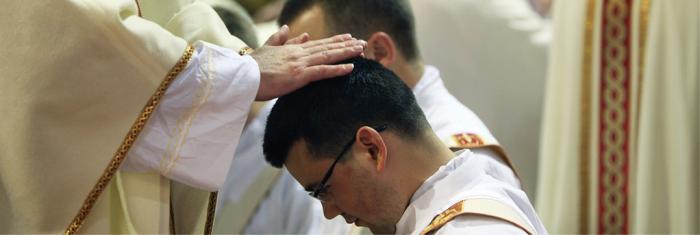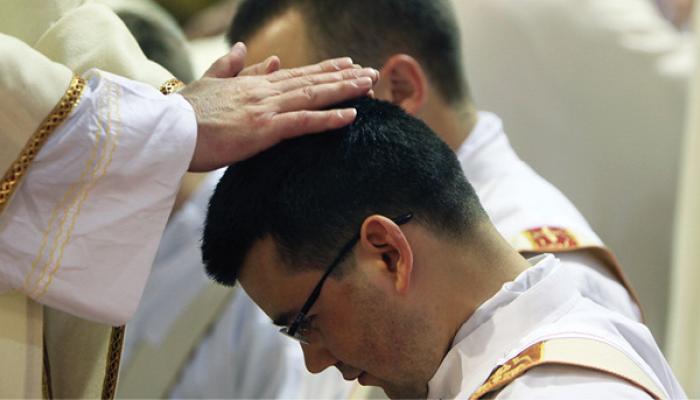
3.41 Why can’t women and married men become priests?
Jesus deliberately chose only men as Apostles. His female disciples were given a different, though no less important, role. Like his predecessors, Pope Francis is committed to involving both women and men in the governance of the Church, within the situation defined by Jesus.
The Apostles passed their ministry on to their successors (the bishops) and their helpers (priests and deacons). In the Western Catholic Church, priests and bishops in principle remain unmarried. They have freely chosen to totally dedicate themselves to Jesus in a celibate state of life, and to follow Jesus’ example in everything. This allows them to be completely free to go where Jesus and the Church send them.
Why is this sacrament called Holy Orders?
Orders designates an ecclesial body into which one enters by means of a special consecration (ordination). Through a special gift of the Holy Spirit, this sacrament enables the ordained to exercise a sacred power in the name and with the authority of Christ for the service of the People of God. [CCCC 323]
What happens in Holy Orders?
The man who is ordained receives a gift of the Holy Spirit that gives him a sacred authority that is conferred upon him by Christ through the bishop.
Being a priest does not mean just assuming an office or a ministry. Through Holy Orders a priest receives as a gift a definite power and a mission for his brothers and sisters in faith. [Youcat 249]
Who can receive this sacrament?
This sacrament can only be validly received by a baptized man. The Church recognizes herself as bound by this choice made by the Lord Himself. No one can demand to receive the sacrament of Holy Orders, but must be judged suitable for the ministry by the authorities of the Church. [CCCC 333]
How is the sacrament of Holy Orders celebrated?
The sacrament of Holy Orders is conferred, in each of its three degrees, by means of the imposition of hands on the head of the ordinand by the Bishop who pronounces the solemn prayer of consecration. With this prayer he asks God on behalf of the ordinand for the special outpouring of the Holy Spirit and for the gifts of the Spirit proper to the ministry to which he is being ordained. [CCCC 331]
How does the Church understand the sacrament of Holy Orders?
The priests of the Old Covenant saw their duty as mediating between heavenly and earthly things, between God and his people. Since Christ is the “one mediator between God and men” (1 Tim 2:5), he perfected and ended that priesthood. After Christ there can be an ordained priesthood only in Christ, in Christ’s sacrifice on the Cross, and through a calling and apostolic mission from Christ.
A Catholic priest who administers the sacraments acts not on the basis of his own power or moral perfection (which unfortunately he often lacks), but rather “in persona Christi”. Through his ordination, the transforming, healing, saving power of Christ is grafted onto him. Because a priest has nothing of his own, he is above all a servant. The distinguishing characteristic of every authentic priest, therefore, is humble astonishment at his own vocation. [Youcat 250]
Is it demeaning to women that only men may receive the sacrament of Holy Orders?
The rule that only men may receive Holy Orders in no way demeans women. In God’s sight, man and woman have the same dignity, but they have different duties and charisms. The Church sees herself as bound by the fact that Jesus chose men exclusively to be present at the Last Supper for the institution of the priesthood. Pope John Paul II declared in 1994 “that the Church has no authority whatsoever to confer priestly ordination on women and that this judgment is to be definitively held by all the Church’s faithful”.
Like no one else in antiquity, Jesus provocatively affirmed the value of women, bestowed his friendship on them, and protected them. Women were among his followers, and Jesus highly valued their faith. Moreover, the first witness to the resurrection was a woman. That is why Mary Magdalene is called “the apostle of the apostles”. Nevertheless, the ordained priesthood (and consequently pastoral ministry) has always been conferred on men. In male priests the Christian community was supposed to see a representation of Jesus Christ. Being a priest is a special service that also makes demands on a man in his gender-specific role as male and father. It is, however, not some form of masculine superiority over women. As we see in Mary, women play a role in the Church that is no less central than the masculine role, but it is feminine.Eve became the mother of all the living (Gen 3:20). As “mothers of all the living”, women have special gifts and abilities. Without their sort of teaching, preaching, charity, spirituality, and guidance, the Church would be “paralyzed on one side”. Whenever men in the Church use their priestly ministry as an instrument of power or do not allow opportunities to women, they offend against charity and the holy spirit of Jesus. [Youcat 257]
Why does the Church require priests and bishops to live a celibate life?
Jesus lived as a celibate and in this way intended to show his undivided love for God the Father. To follow Jesus’ way of life and to live in unmarried chastity “for the sake of the kingdom of heaven” (Mt 19:12) has been since Jesus’ time a sign of love, of undivided devotion to the Lord, and of a complete willingness to serve. The Roman Catholic Church requires this way of life of its bishops and priests, while the Eastern Catholic Churches demand it only of their bishops.
Celibacy, says Pope Benedict, cannot mean “remaining empty in love, but rather must mean allowing oneself to be overcome by a passion for God”. A priest who lives as a celibate should be fruitful inasmuch as he represents the fatherly character of God and Jesus. [Youcat 258]
The virgin Christ and the virgin Mary have dedicated in themselves the first fruits of virginity for both sexes. The Apostles have either been virgins or were married... Those persons who are chosen to be bishops, priests, and deacons are either virgins or widowers; or at least, when once they have received the priesthood, are vowed to perpetual chastity. [St. Jerome, Letters, 48:21 (ML 22, 510)]
[Regarding the ordination of] woman priests, this cannot be done. Pope Saint John Paul II, when the question was being raised, after very lengthy reflection, stated this clearly. Not because women aren’t capable, but… look, in the Church, women are more important than men, because the Church is a woman. We speak of the Church as “she”; she is the Bride of Christ, and Our Lady is more important than popes, bishops and priests. [Pope Francis, In-Flight Press Conference, 27 Sept. 2015]





